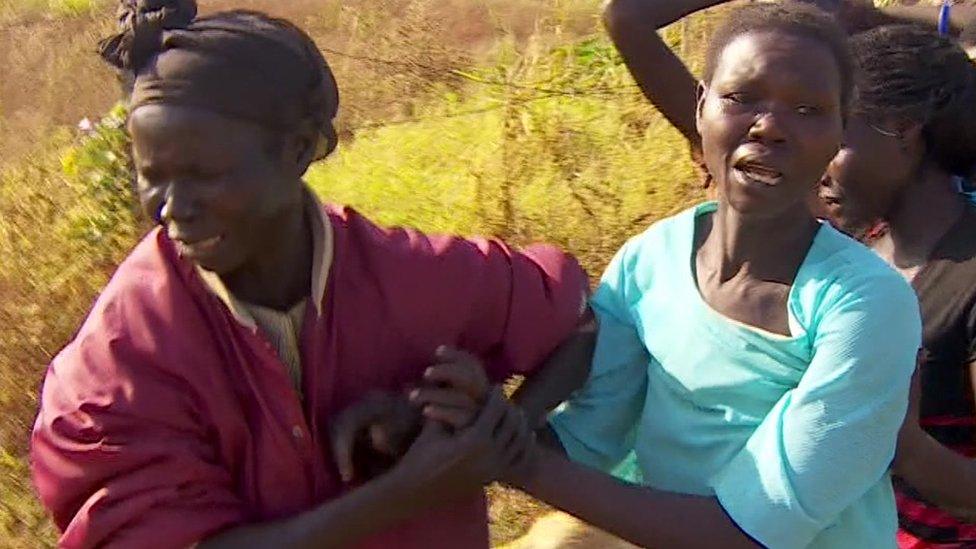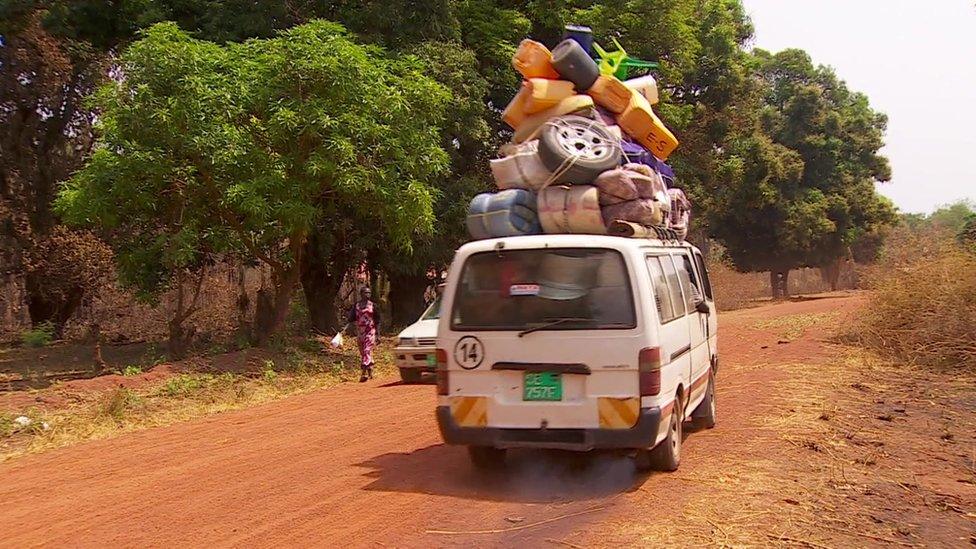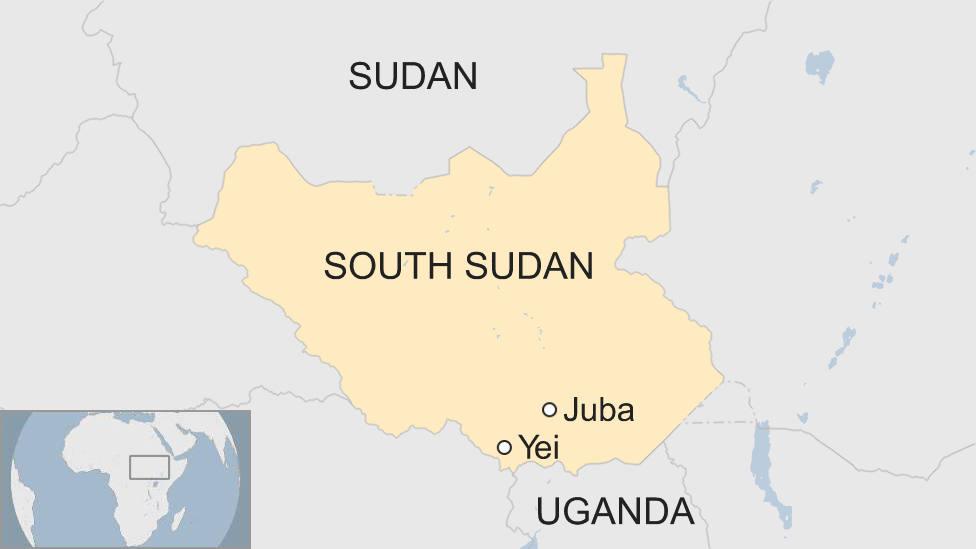South Sudan conflict: 'Soldiers will kill you for no reason in Yei'
- Published
'My sister was raped by three soldiers'
The South Sudanese teenager's body was laid out on a bed, under a tree, beneath a mosquito net.
On one bedpost hung the metal ligature which had cut into his neck when he was strangled. Another piece of wire had been tied around his ankles.
One of the children who had been fishing in the river saw Isaac's body.
Those who had not fled the village knew him well, and now they were waiting for his mother to arrive.
People in Yei are afraid - afraid to speak out, and afraid they might be the next ones to be pulled from their homes in the middle of the night and to turn up dead in the river.
The government faction of the Sudan People's Liberation Army (SPLA) controls the town of Yei, 150km (93 miles) south-west of the capital, Juba, but not too much around it.
A few miles out along any of the roads - to the Juba or to Uganda, they only travel in large convoys as military vehicles are prone to guerrilla attack.
The rebels are known as the SPLA In Opposition, or "IO", but when civil war spread to this previously peaceful part of South Sudan everything became even more complicated.

Isaac's mother (L) was distraught when she came to view her teenage son's body
What began in December 2013 as a political crisis, almost immediately became ethnic, as the two largest tribes turned on each other - the Dinka and the Nuer - the ethnic groups of the president, and the former vice-president - now the rebel leader.
There were massacres, the army split broadly along ethnic lines, and civil war has now driven millions from their homes, brought famine to parts of the country and created an impunity which has allowed rape, killing and war crimes to run wild.
The SPLA is not a terribly disciplined army, and although both sides have been accused of atrocities here they are blamed for most of them.
We joined their patrols - on foot and by car - as they showed us abandoned villages and some burned huts which they blamed on wild fires.

Brigadier General Chol Deng Chol

"There's no raping, there's no killing. We use capital punishment against soldiers who commit rapes"

But they wouldn't take us to some of the places where we'd heard atrocities had been carried out - it was "too far," or the "roads were too bad."
There are different layers to the government security forces in Yei - the regular army, the national security officers, the police, and another group known as the Matiang Anyoor.
People are afraid of the Matiang Anyoor.
"They are just another battalion," said Brigadier General Chol Deng Chol who is in overall charge - and has been since the violence started in Yei.
But as a unit of mainly Dinka soldiers, said to have been established by the head of the army, they are the ones suspected of perpetrating some of the worst atrocities in Yei.

Thousands of people are fleeing South Sudan every day
"There's no raping, there's no killing. We use capital punishment against soldiers who commit rapes," said Gen Chol.
"The only people we fight are the rebels. This is when the killing occurs. We don't kill our own civilians in our own country," he said.
"They pretend civilians were killed, when the people killed were rebels."
But the testimony we collected in our short time in Yei directly contradicted his assurances.
Harrowing testimonies
Everyone was afraid to be identified, but they all had terrible stories.
One man described how his sister was raped by three soldiers, an older woman how she was robbed and badly beaten in her own home.
Another man told of 10 young men being pulled from their individual family homes, chained together and then shot.

South Sudan in a nutshell:

World's newest country, gaining independence from Sudan in 2011
One of Africa's least developed economies, despite potential oil wealth
Population of 7.5m-10m and home to more than 60 different ethnic groups
Power struggle between president and vice-president descended into civil war in 2013
Political conflict escalated into wider ethnic conflict between Dinka and Nuer groups
Millions have been forced from their homes
Famine declared in parts of the country in 2017; UN calls it a man-made disaster
Government is accused of (and denies) blocking aid to areas thought sympathetic to rebels

There was the description of a pregnant woman killed and then the baby cut from her womb and left to die.
There are many accounts of cattle theft, of robbery and murder.
"There are now two people who have been killed in my family: My brother and my father," said one of the men we spoke to.
"It was government troops. For no reason they will kill you. They make the raping, looting (sic).
"That's why people are afraid. That's why thousands of people flew out the town of Yei - because of their behaviour."
'Potential for genocide'
Every day an average of 2,000 people are crossing into Uganda from the old-established states of Western, Central and Eastern Equatoria in the south of the country.
This region has some of the best agricultural land in South Sudan, but people have not harvested and are not planting.
With more than five million people - half the population - needing food aid in the next few months, this deepens the crisis.
South Sudan is the world's youngest country and much of the region's recent history has been characterised by violence.
Around half a million people have fled in the eight months since a peace deal in Juba dramatically collapsed in fighting, and government forces chased the rebel leader and his men through this area and out of the country.
This was a peaceful farming region where different tribes lived together, but now the army is often described as "the Dinka army" and a cycle of killing and revenge killing has escalated between the Dinka and other ethnic groups.
That is why the UN warned of "the potential for genocide" in this part of South Sudan.
"As yet we haven't seen that Rwanda type of situation - I doubt we will see that sort of thing," said David Shearer, the new special representative of the UN secretary general in the country.
But he said: "A lot of it is breaking down into one ethnic group against another."
Back in the village by the river Isaac's mother arrived screaming, and collapsed, pounding her hands on to the ground in grief.
He is just the latest person to disappear in the night, the latest victim of what people in Yei believe is a deliberate attempt by their own army to drive them away from their homes.
Any end to the fighting, the war crimes and the impunity seems as far away as ever.